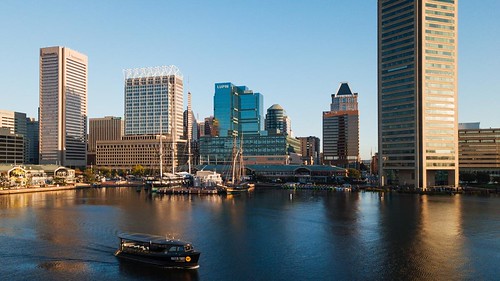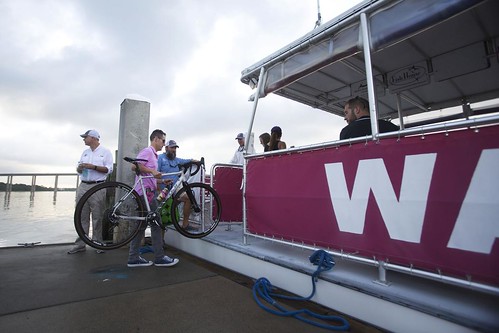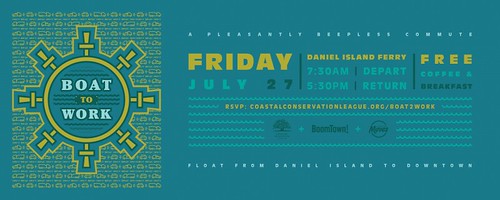Boat to Work Day in Charleston, SC: is a promotion that other water-based transportation services ought to adopt
It's pretty cold these days, which makes it tough to think about ferry and water taxi commuting, even though that's something that persists even in cold weather in New York City, Boston, San Francisco, and Seattle.

Baltimore Water Taxi, Inner Harbor skyline
Some water taxi services operating in cities, but mostly focused on the tourist market, do provide special pricing for commuter use.
-- "SA River Commuter Service Draws Excitement, But Few Riders So Far," Rivard Report
-- Chicago Water Taxi commuter webpage
-- "Water taxi's free rides are part of broader strategy to boost local ridership," Baltimore Business Journal
From the BBJ article:
While the boats are popular with tourists, the company wants to boost ridership among residents commuting to and from work, exploring the city on weekends or heading to happy hour, said Stacy Steinberg, Baltimore Water Taxi's director of sales and marketing. Some 150,000 people used the water taxi in 2017, though a breakdown of how many of these riders were tourists and how many were Baltimoreans wasn't available.Charleston, DC's Boat to Work Day. I came across an article in the Charleston Post & Courier mentioning how a pier expansion project in Mount Pleasant failed to ask for specific federal approvals for the potential for transportation purposes, and so such won't be included at least initially.
"We feel that locals can very much benefit from our service to get to various areas on the water and be able to get out and explore," Steinberg said. "We want to get the word out while letting people get a ride."
To highlight some of those opportunities, the water taxi is offering free rides to Marylanders Thursday to and from a selection of its 18 stops. To ride for free, you'll have to show a Maryland ID or another proof of residency. ...
Membership options rolled out last month include a 10-pack of one-way ride tickets for $40, a $90 summer pass offering unlimited rides through the end of September and an annual membership for $250. Individual water taxi day passes cost $16, with discounts for children, seniors and members of the military.
One of the photos illustrating the article called attention to a "Boat to Work Day" promotion for the Daniel Island Ferry in Charleston Harbor.

A bicycle commuter boards a water taxi on Daniel Island on Friday, July 27, 2018. The ride was part of Boat to Work Day. A Corps of Engineers permit for Mount Pleasant's Waterfront Memorial Park expansion prohibits commercial uses, including water taxis. Lauren Petracca/Charleston Post & Courier.
The Daniel Island Ferry doesn't offer regular commuting-focused service yet, although they intend to do so later in 2019.
The Boat to Work Day promotion, which included accommodation for bikes, was a special promotion involving conservation and sustainable mobility organizations including the Coastal Conservation League, Charleston Moves (what looks to be a nifty sustainable mobility advocacy group), and Gotcha Bike (bike share), along with a real estate development firm as sponsor, BoomTown.
I think more organizations looking to expand water-based commuting services ought to look creating similar promotions.

==========================
Past writing on water-based transit:
For more detailed discussion including opportunities in DC and Baltimore see:
-- "Instead of a third Chesapeake Bay Bridge, why not start out with a fast ferry from Rock Hall to Baltimore?," 2018
-- "Implementing transit services (water taxi) before the market will support them," 2017
From a round up entry from 2018:
New York City is expanding the ferry system ("NYC Ferry service is getting a major expansion," Time Out) which is the only element of the transit system controlled directly by the city. They'll be adding two routes, and three new vessels each with a capacity of 350 passengers, compared to the 150-person capacity of each boat in the 17 boats in the current fleet.
Commuter Emily Mueller enjoys a drink at the ferry bar on her way home to north Brooklyn on the evening ferry. Village Voice Photo: David Williams.
Before the recent agreement by Mayor DeBlasio to fund a lower cost transit pass for low income residents, advocates criticized the transit focus on ferries as helping the well off, especially because under mayor DeBlasio, the ferry fare is equal to the subway fare,$2.75, making it heavily subsidized.
From the Village Voice article "Foamland security: ferry riders say DeBlasio's subsidies spare them subway trauma":
Ferry riders are, by and large, higher-income New Yorkers taking advantage of subsidized ferry rides to avoid subways and buses — not because it’s a faster commute, but because of the ferry’s creature comforts such as elbow room, concessions, alcohol, WiFi, and the fresh sea air.London as a counter example: pricing ferry commuter rides as a premium service. On my walking tour of London with former TfL official Ivan Bennett, we talked about the ferry services there, called the River Bus. In planning for river transit, TfL differentiates between commuter transportation and tourist services.
“The time factor has nothing to do with it for me,” explained J. Scott Klossner, a 53-year-old freelancer currently working for the Today show who takes the Rockaway route, even though it adds almost 45 minutes each way to his commute.
“I can get a coffee, a bagel, everyone is nice. The opposite is true of the A train: Everyone is a fucking asshole.”
-- TfL River services
-- London River Services map and guide, Tfl (speaking of branding, it uses the same design style as other London transit services)
-- London River Services map, 2018
Ferry trips on the Thames tend to be slower than rail, but nicer, with coffee service and newspapers. He argues that they should be marketed and priced as premium services, with the extra revenues used to support other aspects of the transit system.
(By contrast, some of the NYC Ferry routes can be faster than rail, because they provide service in areas underserved by the subway.)
That seems like a sensible approach for pricing ferry/water taxi service in London and elsewhere.
While the individual fare is higher than riding the Underground--2x to 4x higher than a single fare, they've slacked off raising River Bus fares, and because of the Crossrail cash crunch, expansions to the system have been delayed.
Labels: ferries/water taxis, infrastructure, rivers and waterfronts, sustainable mobility platform, transit marketing, transit planning, urban design/placemaking





2 Comments:
Urban Planning in India
Thanks for sharing real estate tools. It's really helpful. I would like to add one more lead generation crm into it. That is Market maker leads. Market Maker offers an all in one real estate platform designed to get agents generating listing leads at will.
Post a Comment
<< Home